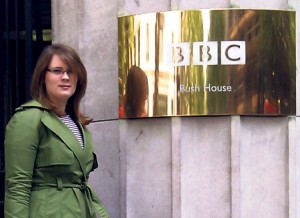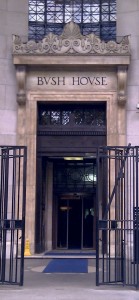SUNDAY, 7 NOVEMBER 2010
 As a PhD student in molecular biology, expeditions to track orangutans or study Icelandic volcanoes are just not going to happen. Nevertheless, I recently got away from the bench to visit Bush House, nerve centre of the BBC World Service, and learn how they produce a science radio show. It may not be the rainforest or Iceland, but I would not exchange it for either.
As a PhD student in molecular biology, expeditions to track orangutans or study Icelandic volcanoes are just not going to happen. Nevertheless, I recently got away from the bench to visit Bush House, nerve centre of the BBC World Service, and learn how they produce a science radio show. It may not be the rainforest or Iceland, but I would not exchange it for either.On entering Bush House, I was struck by the charged atmosphere. Every team, every producer, every presenter is working on something that a sizeable chunk of the world tunes into every week; the subject matter is as diverse as the listeners of the World Service. I was there, along with fellow science communication enthusiast Harry Harris, to see how they produce the BBC science programme Material World.
The production process is as energetic as the surroundings. Each week, scientific press releases are filtered for impact and interest. The resulting shortlist is then refined by telephone interviews with the researchers behind each story. The most engaging are selected to be interviewed on the programme and a final set of notes is passed to the presenter. They use this to write the script with the producer, allowing them to introduce their own flair for engaging with the audience. Harry and I arrived in the final stages of the redrafting process. Once the words were in place, we joined the production team in the studio as the countdown began.
The show must start and end precisely on time – you cannot hold up the day’s broadcasting while you finish your sentence. Since the scientists who are being interviewed are not reading from a script, the production team has to calculate the exact time remaining after each feature; the presenter must constantly adjust the script accordingly. The atmosphere is charged throughout, and as the show comes to an end – on exactly the right second – the studio buzzes with the excitement of a job well done.
 It was an extraordinary experience to see the production of a live radio show, and we look forward to putting what we learned to good use at the community radio station, Cambridge105. Through our own project, GetSET, we plan to broadcast Cambridge science news to the community, with the goal of opening up the science, engineering and technology research of Cambridge to everyone who lives here.
It was an extraordinary experience to see the production of a live radio show, and we look forward to putting what we learned to good use at the community radio station, Cambridge105. Through our own project, GetSET, we plan to broadcast Cambridge science news to the community, with the goal of opening up the science, engineering and technology research of Cambridge to everyone who lives here.Despite the differences in studio and audience size, Material World and GetSET have one key feature in common: an enthusiasm for sharing scientific discoveries in a way that everyone can enjoy. After all, you shouldn’t need a degree in art to enjoy a Picasso, nor a qualification in theatre studies to be moved by Shakespeare – neither should you need a PhD to appreciate the best that science has to offer.
Material World is broadcast every Thursday at 4.30pm on BBC Radio 4.
For further information about GetSET, email: sarah.leigh-brown@cancer.org.uk.
Sarah Leigh-Brown is a PhD student in the Department of Oncology
